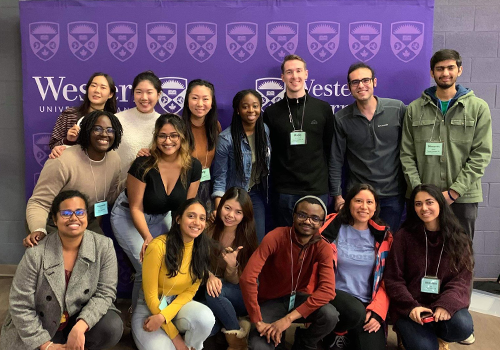Mentor program opens new doors for thousands of international students and their student guides

A powerful student mentoring program at Western that has been helping new international students succeed, while helping upper-year students build connections, friendships, and career skills, is celebrating its 30th anniversary this year.
Developed as an initiative to provide mentorship and resources for students coming from abroad, the International Peer Guide program quickly became a community, offering the more than 5,000 students who have participated countless opportunities to share laughter, to provide or accept a helping hand, and to find a sense of belonging at Western.
“The Peer Guide program was my home at Western,” said Rachel Crowe, BSc’00, a former peer guide and former program coordinator. “If you're coming from overseas and adjusting, you're so far from home. There are a lot of differences. Sometimes it can be hard to connect with people who haven't had that experience, so connecting with someone who is familiar with what you're going through is huge.
“The program does a lot of practical things too, but the fact that there's such an emphasis put on developing meaningful connections, amongst the peer guides, between peer guides and peers, and with the staff, makes it as successful as it is.”
The program launched in 1992 and was spearheaded by then-International Student Coordinator Rose Aquino, a registered psychotherapist, currently serving as a Mental Health Counsellor in Western's Wellness and Well-being Department and whose work focuses on supporting Black and Racialized students. New undergraduate and graduate international students, called peers, are encouraged to sign up to be matched with an upper-year student peer guide, who is trained to help them transition to Canada and to Western.
“I wanted to meet people, make friends and get help in learning how to get around the city and the university,” said Roberto Hernandez-Enriquez, MSc’02, a former international student and peer. “English is not my first language. I studied English at university and did small trips to other countries, but that was my first time speaking full-time in English. I was very, very shy. Being in the Peer Guide program helped me to be less lonely.”
The focus on community and importance of providing a welcoming and safe space for participants to learn together has contributed to the program’s popularity and “magic” over the years.
“To me, it seems like a hidden gem or best-kept secret on campus. It’s an amazing group of students who are there for and ready to help students in their transition to Western,” said Fabiana Tepedino, BACS'02, Western International Programs Coordinator and a former peer guide herself.
“We take the students’ lead in providing what support they need. Some students just need to know that someone is there to answer questions, and some are looking for a mentor, or a friend. International students who are peers often become peer guides the following year. People don’t seem to want to leave the program once they join.”
While the program aims to offer newly arrived international students support in their cultural adjustment and community connection by engaging with current domestic and international students, it also provides upper-year students and graduate students with opportunities for intercultural engagement at a local level, and for cross-cultural skills development.
“It was clear when we were developing the program that the new international student population had unique needs that could be addressed in a more intentional way by designing support programming using a cultural adjustment/transitions and diversity lens – a rarity then. That was way before equity, diversity and inclusion, and anti-oppression initiatives came into being,” said Aquino.
Beginning with a “small but mighty” team of 10 peer guides and 40 peers the first year, the program has grown to include more than 100 peer guides and more than 600 international student peers each year.
"Our recruitment and training process for peer guides is intense but provides unique opportunities for the team to learn, share and bond." said Sandra Pehilj, BA’97, International Student Advisor and a former coordinator of the program. “There are three days of training on topics, including intercultural communication, psychological services to support different cultures and backgrounds, and understand micro-aggressions and discrimination."
There is also an emphasis on confidentiality and liability. “Students are trained to help within the boundaries – they know how much they can offer, and they stay within the scope of what the position allows. We try to set them up as best we can to succeed. We give them love and support and they pass it along to the students they need to care of.”
For many past participants – both peer guides and the peers they’ve supported – the program played a large role in shaping their lives, helping them to succeed in their academic journeys at Western, as well as to become global citizens and build valuable skills.
“The Peer Guide program had a significant impact on my career,” said Georgette Stubbs, BMOS’11, an entrepreneur focused on career counselling and a former peer guide. “It taught me skills around program design, how to support people coming from all over the world and adjusting to a new place, how to build a community and manage projects, and how to help others who may not even know the questions that they should be asking in a situation.”
As the program marks its anniversary and the many accomplishments of its participants, the emphasis on continuing and celebrating the close-knit community it creates remains a top priority.
“As peers and peer guides, we are part of a big family. I would always feel relief after a full day of classes, or just in the middle of exams, knowing that I could go to a peer guide meeting,” said Jimmy Li, HBA’17. “Staff would bring treats, people would share stories, just chat and relax. That was very important to me – that was something that made me feel that I belonged, in the midst of everything that was happening in my university days.”


